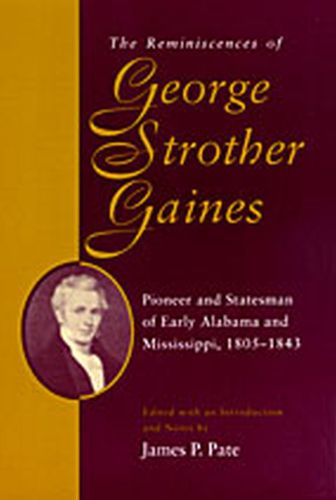Readings Newsletter
Become a Readings Member to make your shopping experience even easier.
Sign in or sign up for free!
You’re not far away from qualifying for FREE standard shipping within Australia
You’ve qualified for FREE standard shipping within Australia
The cart is loading…






Provides a fascinating glimpse into the early history of the Mississippi-Alabama Territory and antebellum Alabama
The two sections of the Reminiscences of George Strother Gaines form one of the most important primary sources on the early history of Alabama and Mississippi. The Reminiscences cover the years 1805 to 1843, during which time Gaines served as assistant factor and then factor of the Choctaw trading house (1805-18), cashier of Tombeckbee Bank in St. Stephens (1818-22), a merchant in Demopolis (1822-32), and finally a banker and merchant in Mobile (1832-43). In addition, Gaines played a key role in Indian-white relations during the Creek War of 1813-14, served a two-year term in the Alabama Senate (1825-27), led a Choctaw exploring party to the new Choctaw lands in the West following the Treaty of Dancing Rabbit Creek (1830-31), and served as the superintendent for Choctaw removal (1831-32).
Gaines dictated his Reminiscences in 1871 at the age of eighty-seven. Part of the Reminiscences, referred to as the first series, was originally published in five issues of the Mobile Register in June-July 1872 as Notes on the Early Days of South Alabama. Nearly a century later, the first series and the previously unpublished second series, Reminiscences of Early Times in Mississippi Territory, were published in a 1964 issue of the Alabama Historical Quarterly as Gaines’ Reminiscences.
In this first book-length edition of the Reminiscences, James Pate has provided an extensive biographical introduction, notes, illustrations, maps, and appendixes to aid the general reader and the scholar. The appendixes include additional unpublished primary materials-including interviews conducted by Albert James Pickett in 1847 and 1848 that provide further information about this important early pioneer and statesman.
$9.00 standard shipping within Australia
FREE standard shipping within Australia for orders over $100.00
Express & International shipping calculated at checkout
Provides a fascinating glimpse into the early history of the Mississippi-Alabama Territory and antebellum Alabama
The two sections of the Reminiscences of George Strother Gaines form one of the most important primary sources on the early history of Alabama and Mississippi. The Reminiscences cover the years 1805 to 1843, during which time Gaines served as assistant factor and then factor of the Choctaw trading house (1805-18), cashier of Tombeckbee Bank in St. Stephens (1818-22), a merchant in Demopolis (1822-32), and finally a banker and merchant in Mobile (1832-43). In addition, Gaines played a key role in Indian-white relations during the Creek War of 1813-14, served a two-year term in the Alabama Senate (1825-27), led a Choctaw exploring party to the new Choctaw lands in the West following the Treaty of Dancing Rabbit Creek (1830-31), and served as the superintendent for Choctaw removal (1831-32).
Gaines dictated his Reminiscences in 1871 at the age of eighty-seven. Part of the Reminiscences, referred to as the first series, was originally published in five issues of the Mobile Register in June-July 1872 as Notes on the Early Days of South Alabama. Nearly a century later, the first series and the previously unpublished second series, Reminiscences of Early Times in Mississippi Territory, were published in a 1964 issue of the Alabama Historical Quarterly as Gaines’ Reminiscences.
In this first book-length edition of the Reminiscences, James Pate has provided an extensive biographical introduction, notes, illustrations, maps, and appendixes to aid the general reader and the scholar. The appendixes include additional unpublished primary materials-including interviews conducted by Albert James Pickett in 1847 and 1848 that provide further information about this important early pioneer and statesman.